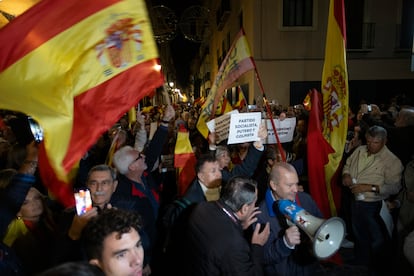Spain’s PM and Catalan separatists close amnesty deal, clearing his way to power
Facing opposition from the Spanish justice system, negotiators took a week to fine-tune the legal wording of the law that will allow Pedro Sánchez to form a new government in the coming days

Spain’s Socialists (PSOE) and the Catalan separatist party Junts have finalized an agreement for an amnesty law that will allow acting prime minister Pedro Sánchez to form a new national government following inconclusive elections in July. The investiture vote in parliament will be held in the next few days, according to sources familiar with the negotiation. These sources suggested that it could happen early next week, possibly on Monday and Tuesday. Failure to form a government by November 27 would trigger fresh elections.
Ongoing talks between Socialists and Catalan separatist leaders were delayed for an additional week mainly because the latter were afraid that a loose wording of the amnesty law might leave out some people from the circle of Carles Puigdemont, the self-exiled leader of Junts who led the unsuccessful breakaway attempt from Spain in 2017 and fled to Belgium to avoid being tried back home.
Above all, Puigdemont’s team feared that some Spanish judges who clearly oppose the amnesty might find legal loopholes to avoid applying it. A judge in Spain’s national high court, the Audiencia Nacional, on Monday announced an investigation into Puigdemont and others on possible terrorism charges in connection with mass protests across Catalonia, including one at the Barcelona Airport, in 2019. A majority sector of the justice system in Spain is against the amnesty law. The conservative APM, the most important legal association, has gone so far as to say that the amnesty is “the beginning of the end” of democracy. For years, Sánchez and his ministers had insisted that amnesty was not possible because it was neither desirable nor constitutional. Now that they have embraced it, they have to fine-tune the text to ensure the Constitutional Court does not knock it down.

Meanwhile, street protests that had been taking place across Spain against the amnesty began to turn violent. On Tuesday, thousands of people turned up in front of PSOE headquarters in Madrid, heeding calls by groups with ties to the far right. The rioting led to six arrests, 40 people who required medical assistance and extensive property damage. A police source said that many of the violent protesters were linked to “radical soccer fan groups.”
The final deal is to be officially sealed in Brussels on Thursday. The political right has sought to portray it as Sánchez selling out to separatists who tried to break Spain in order to remain in power. His attempt at getting voted back into office comes after Alberto Núñez Feijóo, leader of the mainstream conservative Popular Party (PP), failed to secure enough support to form a government of his own after the July election, which gave his party the most votes but not enough for a majority.
Sánchez, who came in second, can count on the votes of the left-wing alliance Sumar but still needs extra backing from small groups that include Junts and the Catalan Republican Left (ERC). Last week, the PSOE reached a deal with ERC to transfer power over local trains to the Catalan government and to pardon 20% of the region’s debt, representing around €15 billion that was owed to a Spanish regional fund. Sánchez has described the overall deal as a way to bring social peace to Catalonia.
Núñez Feijóo said this week that the amnesty is tantamount to “corruption.” Meanwhile, the PSOE spokesperson, Patxi López, struck a dramatic tone: “In the face of the amnesty, which was a brave decision, we find a brutal campaign of the right, which considers all those who do not think like them as enemies of Spain and which dehumanizes the adversary. And then we end up with houses attacked and spray painted, with socialist leaders threatened and insulted in the streets, socialist sympathizers being singled out in the purest Nazi style. There are things that are very dangerous because we don’t know how they will end.”
Sign up for our weekly newsletter to get more English-language news coverage from EL PAÍS USA Edition
Tu suscripción se está usando en otro dispositivo
¿Quieres añadir otro usuario a tu suscripción?
Si continúas leyendo en este dispositivo, no se podrá leer en el otro.
FlechaTu suscripción se está usando en otro dispositivo y solo puedes acceder a EL PAÍS desde un dispositivo a la vez.
Si quieres compartir tu cuenta, cambia tu suscripción a la modalidad Premium, así podrás añadir otro usuario. Cada uno accederá con su propia cuenta de email, lo que os permitirá personalizar vuestra experiencia en EL PAÍS.
¿Tienes una suscripción de empresa? Accede aquí para contratar más cuentas.
En el caso de no saber quién está usando tu cuenta, te recomendamos cambiar tu contraseña aquí.
Si decides continuar compartiendo tu cuenta, este mensaje se mostrará en tu dispositivo y en el de la otra persona que está usando tu cuenta de forma indefinida, afectando a tu experiencia de lectura. Puedes consultar aquí los términos y condiciones de la suscripción digital.








































